| dc.contributor.advisor | Saksvik, Per Øystein | nb_NO |
| dc.contributor.author | Evans, Josiane | nb_NO |
| dc.date.accessioned | 2014-12-19T14:42:01Z | |
| dc.date.available | 2014-12-19T14:42:01Z | |
| dc.date.created | 2011-09-07 | nb_NO |
| dc.date.issued | 2011 | nb_NO |
| dc.identifier | 439236 | nb_NO |
| dc.identifier.uri | http://hdl.handle.net/11250/270656 | |
| dc.description.abstract | Absenteeism is a community problem when one looks at the amount of money spent because of it, an amount that could have been used on other more important matters. For this thesis I set out to study absenteeism in nursing homes here in my town, Trondheim. I wanted to study the nursing homes with relatively low absenteeism rate and the nursing homes with relatively high absenteeism rate to see if I could find differences that could explain the differences in their absenteeism rates. Interviews were used to gather data from four different nursing homes in Trondheim, and the participants were the manager and two caregivers from each nursing home, a total of twelve participants. A qualitative analysis approach was chosen to analyze the data I had obtained in order to increase my understanding of them, and the findings indicate that the differences between the nursing homes are there.
The results indicate that there are individual, leadership and organizational differences. Individually, the employees from the nursing homes with low absenteeism rate handle stressful situations better and they are healthier than those from nursing homes with high absenteeism. On the leadership’s side, the managers from the nursing homes with low absenteeism have more insight into the employees every day work situation; they are more visible, supportive and protective of the employees than the managers of the nursing homes with high absenteeism. Organizationally, the nursing homes with low absenteeism use fewer substitutes and they distribute the available caregivers better on the different shifts. Based on this study’s findings, absenteeism is a complex problem that requires commitment from each member and collaboration between all the members of the organization if it is to be kept at the acceptable. | nb_NO |
| dc.language | eng | nb_NO |
| dc.publisher | Norges teknisk-naturvitenskapelige universitet, Fakultet for samfunnsvitenskap og teknologiledelse, Psykologisk institutt | nb_NO |
| dc.subject | Social and Behavioural Science, Law | en_GB |
| dc.title | Absenteeism- a complex problem: A study on absenteeism in Trondheim’s nursing homes | nb_NO |
| dc.type | Master thesis | nb_NO |
| dc.source.pagenumber | 69 | nb_NO |
| dc.contributor.department | Norges teknisk-naturvitenskapelige universitet, Fakultet for samfunnsvitenskap og teknologiledelse, Psykologisk institutt | nb_NO |
